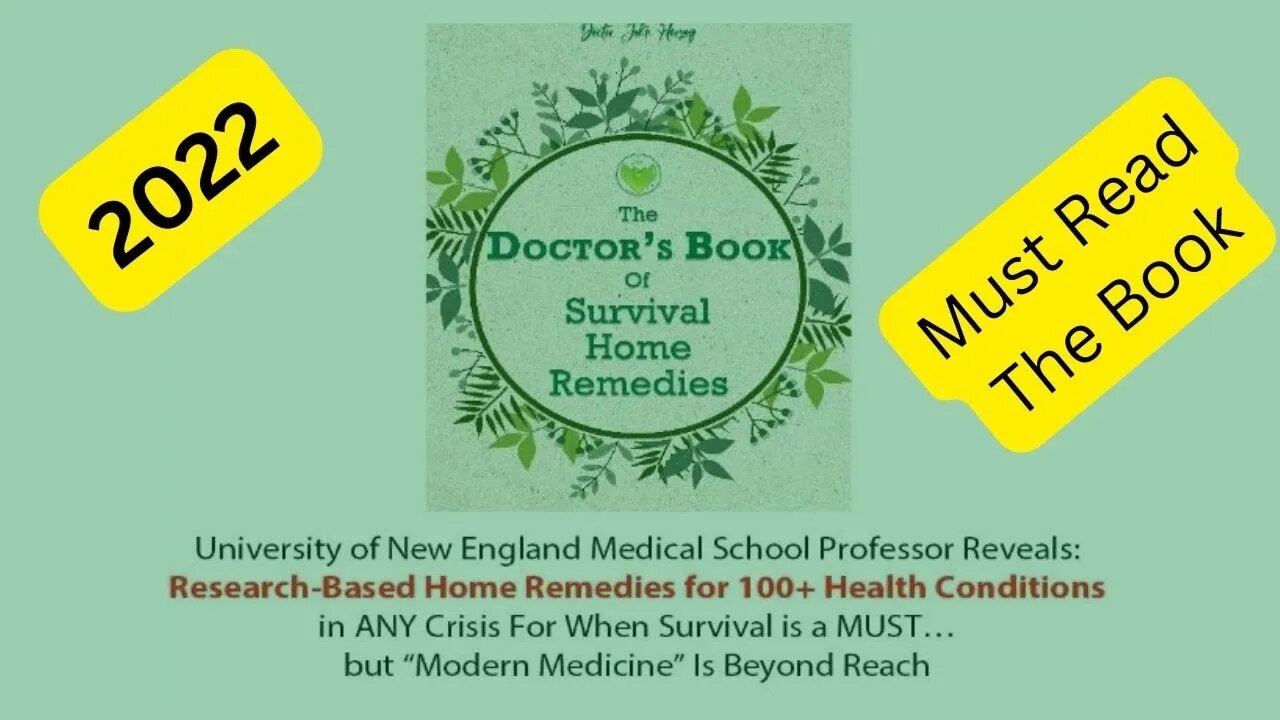Premium Only Content

Dr. MD's Home Survival Guide: How to Stay Healthy in Uncertain Times #trending #subscribe #facts
Dr. MD's Home Survival Guide: How to Stay Healthy in Uncertain Times
Get starting here is the link : https://oke.io/73EV5D10
These are unsettling times, my friends—and the future looks even more uncertain than the present. If you’re concerned about these issues—and any other health or medical issue you or your family might face in this uncertain environment—I have good news and bad news. The good news? I have some effective home remedies that will help you cope and even thrive in this time of uncertainty...
Heart Disease
While heart disease used to be a condition affecting mostly the elderly, younger people are also beginning to suffer from this chronic disease. One of the most important things you can do for your heart is avoid eating trans-fats and sugars which are found in too many pre-packaged foods. Studies have shown that a healthy diet will slow down the progression of heart disease by reducing high cholesterol levels and risk of blood clots that could lead to a heart attack or stroke.
Memory Problems
Maintaining your memory health can be difficult, but not impossible. With the right steps, you may be able to keep a strong cognitive function as we go through this time of crisis and find new treatments emerge.
Getting Sick Easily
In any prolonged power outage, food and water sources can become scarce or contaminated with bacteria or viruses, causing illnesses like diarrhea, Salmonella poisoning and Norovirus - so be sure to have an oral hygiene routine and stay away from close contact with people who are sick. You may also want to add a high-fiber diet that includes foods rich in iron, vitamin C and zinc - these nutrients help your immune system fight back against invaders!
Immunity Boosters
In the coming days, your immunity may suffer due to worries, lack of sleep and exposure to flu-carrying passengers on public transit. Here are three ways to help keep your immune system strong when you're under stress:
(1) Get a full night's sleep. Sleep deprivation decreases your immune response by impairing the functioning of white blood cells (immune cells). When you're stressed, it can be hard to fall asleep or stay asleep for eight hours. Try these strategies for a better night's rest: (2) Eat a balanced diet that is high in vitamins A and C, zinc and magnesium. (3) Exercise for at least 30 minutes five times per week.
-
 6:48:50
6:48:50
Akademiks
14 hours agoKendrick Lamar and SZA disses Drake and BIG AK? HOLD UP! Diddy, Durk, JayZ update. Travis Hunter RUN
156K27 -
 11:45:14
11:45:14
Right Side Broadcasting Network
9 days agoLIVE REPLAY: TPUSA's America Fest Conference: Day Three - 12/21/24
340K28 -
 12:19
12:19
Tundra Tactical
14 hours ago $12.74 earnedDaniel Penny Beats Charges in NYC Subway Killing
62.8K12 -
 29:53
29:53
MYLUNCHBREAK CHANNEL PAGE
1 day agoUnder The Necropolis - Pt 1
153K51 -
 2:00:10
2:00:10
Bare Knuckle Fighting Championship
3 days agoCountdown to BKFC on DAZN HOLLYWOOD & FREE LIVE FIGHTS!
55.7K3 -
 2:53:01
2:53:01
Jewels Jones Live ®
1 day agoA MAGA-NIFICENT YEAR | A Political Rendezvous - Ep. 103
148K36 -
 29:54
29:54
Michael Franzese
17 hours agoCan Trump accomplish everything he promised? Piers Morgan Article Breakdown
134K56 -
 2:08:19
2:08:19
Tactical Advisor
21 hours agoThe Vault Room Podcast 006 | Farwell 2024 New Plans for 2025
198K11 -
 34:12
34:12
inspirePlay
1 day ago $6.00 earned🏆 The Grid Championship 2024 – Cass Meyer vs. Kelly Rudney | Epic Battle for Long Drive Glory!
95.7K8 -
 17:50
17:50
BlackDiamondGunsandGear
19 hours ago $3.37 earnedTeach Me How to Build an AR-15
69.3K6